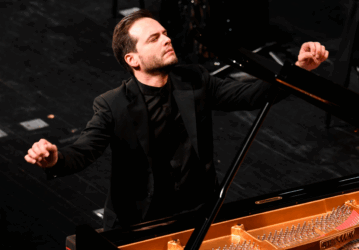 United Kingdom Schubert and Liszt: Francesco Piemontesi (piano). Wigmore Hall, London, 9.5.2025. (MB)
United Kingdom Schubert and Liszt: Francesco Piemontesi (piano). Wigmore Hall, London, 9.5.2025. (MB)

Schubert – Fantasy in C major, D 605a, ‘Graz’; Four Impromptus, D 935
Liszt – Piano Sonata in B minor, S 178
Francesco Piemontesi offered a series of surprises, none unwelcome, in this fine Wigmore Hall recital of music by Schubert and Liszt. No piece was taken for granted, though by the same token, none was remoulded for the sake of remoulding. An array of possibilities was brought to life through exquisite command of touch and formidable foundation of intellect.
The so-called ‘Graz’ Fantasy, D 605a, made for an excellent, even spellbinding opening. I was immediately put in mind of an observation by Donald Tovey on the piano music of Liszt, that it showed – irrespective of its musical quality – he was incapable of making an ugly sound on the keyboard. Simple C major arpeggios sounded as if they were the rarest things in the world, the fifth bar’s flattened submediant piercing as perhaps only Schubert can. The first section as a whole emerged as something akin to a threshold for pianistic Romanticism, its fantasia quality, harking back to Mozart and beyond, in gradual self-revelation. The alla polacca music, in a typically distant – as distant as one can be – F-sharp major was delightfully quirky, dancing as if it were early Chopin. As the music became more involved, Piemontesi’s performance was never cluttered; here, as elsewhere, there was always space, irrespective of tempo, whose fundamental qualities always endured. The serenity with which opening material returned was deeply touching.
The advent of the first of four impromptus, that in F minor, felt like the opening of a new chapter: not exactly presaged by the Fantasy, yet foretold. This was, of course, a different Schubert, from the close of his all-too-brief compositional life; and yet, without contrivance, it was also the same Schubert, similarly spun from the finest of Egyptian cotton, if that is not to undersell. There was something dream-like, though not too dream-like, to the piece’s progression, to the emergence of music that had somehow always been there, waiting simply to be voiced as a song without words. Its ambivalence and the pain of return to the tonic could hardly have been more movingly conveyed. Perhaps the second impromptu, the A-flat Allegretto, was a little understated, a little too innig; or perhaps that was simply a matter of taste. There was no doubting its lyricism, nor that of the B-flat theme and variations, Piemontesi’s disinclination to make a meal of it welcome. Subtlety of melodic line, the telling quality of lilt and breath, and the ‘natural’ quality to this music-making, not least in the unexaggerated pathos of the fourth variation, all proved telling. One can overdo the ‘sonata’ designation to these pieces; if Schubert had intended them as such, he would doubtless have said so. Nonetheless, the fourth, returning to F minor, felt very much like a finale: one that foretold Brahms still more than Liszt, taking its leave nonetheless from the world of the Moments musicaux.
In the introduction to Liszt’s B minor Sonata, Piemontesi seemed determined to show – more to the point, he did – that preconceived oppositions are worth no more than the ether into which they are typed. This music can be taut and rhetorical, if one so chooses, and will most probably benefit from such integrative performance. At any rate, it provided quite the launch pad for the exposition proper, whose initial combination of fury and rhythmic insistence sounded new, not to be compared to previous ‘schools’ of performance. Throughout, decisions that initially had me wonder provided their own confirmation, for instance the continued insistent quality for the coming of the second group. Though on a considerably grander scale, the work in context nonetheless emerged as a mercurial, sulphurous successor to the Schubert Fantasy – not that Liszt could have known it, undiscovered until 1962. Yet its concision truly told too, Liszt’s Beethovenian side inevitably revealing itself amidst, indeed through, the grandiloquence. Again, there was no sense of being rushed; time seemed almost to stand still prior to the fugato, which verily bolted, preparing the way inevitably for return. The (certain) uncertainty in aftershock was not the least surprise in what felt like a symphonic poem for, certainly not reduced to, piano.
Two encores, both again welcome surprises, were a lively account; firstly, Wilhelm Kempff’s transcription of Bach’s Chorale Prelude, ‘Wachet auf, ruft uns die Stimme,‘ BWV 645, which built magnificently, and then a delectable response in ‘Au lac de Wallenstadt’ from Liszt’s first (Swiss) book of Années de pèlerinage.
Mark Berry
